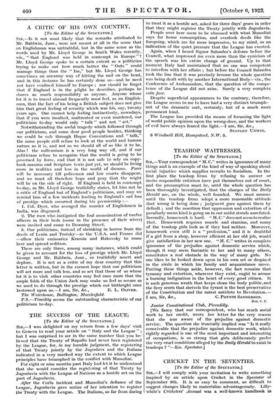A CRITIC OF HIS OWN COUNTRY. [To the Editor of
the SPECTATOR.] SIR,—Is it not most likely that the remarks attributed to Mr. Baldwin, Junr., were not meant at all in the sense that an Englishman was untruthful, but in the same sense as the words used by Mr. Lloyd George in South Wales recently, viz., " that England was held in contempt in Europe " ? Mr. Lloyd George spoke to a certain extent as a politician trying to make out how much better the " Outs " could
manage things than the " Ins," but Mr. Lloyd George has sometimes an uncanny way of hitting the nail on the head, and in this instance he has certainly done so—and he need not have confined himself to Europe ; nor should he forget
that if England is in the plight he describes, perhaps he shares as much responsibility as anyone. Anyone whose lot it is to travel abroad frequently must feel, as an English- man, that the fact of his being a British subject does not give him that great feeling of security which was his, say, twenty years ago. One cannot help feeling instinctively, nowadays, that if you were insulted, maltreated or even murdered, our politicians to-day would only " talk " and not " act."
Notwithstanding the awful tragedy which followed through our politicians, and some dear good people besides, thinking we could be safe through Hague Conventions and " talk," the same people still refuse to look at the world and human nature as it is, and not as we should all of us like it to be.
Alas ! the millennium is a very long way off, and if our politicians refuse to recognize that the world is going to be governed by force, and that it is not safe to rely on copy- book maxims and Scripture texts just yet, we should be living more in realities and less in the world of dreams. Force will be necessary till policemen and law courts disappear, and we must all therefore hope and pray that the might will be on the side of right. If England is held in contempt to-day, as Mr. Lloyd George truthfully states, let him not be a critic of England but of England's politicians, and may we remind him of a few incidents leading to England's sad loss of prestige which occurred during his premiership :-
1. Col. Dyer, who avenged the murder of Englishmen in India, was disgraced.
2. The men who instigated the foul assassination of twelve officers in their beds (some in the presence of their wives) were invited and came to Downing Street.
3. Our politicians, instead of shrinking in horror from the deeds of Lenin and Trotsky—as the U.S.A. and France did —allow their emissaries Krassin and Rakovsky to come here and spread sedition.
These are only three, among many instances, which could be given to account for the loss of prestige which Mr. Lloyd George and Mr. Baldwin, Junr., so truthfully assert and deplore. It is not as a critic of my dear country that this letter is written, but in the earnest hope that our politicians will act more and talk less, and so act that those of us whose lot it is to visit other countries may feel once more that the ample folds of the Union Jack may make us feel as secure as we used to do through the prestige which our birthright once
bestowed upon us.—I am, Sir, &c., E. L. OLIVER.
The Waterhouse, Bollington, Macclesfield.
P.S.—Timidity seems the outstanding characteristic of our politicians to-day.










































 Previous page
Previous page